Sustainable Development and Green Communication: African and by J. Servaes
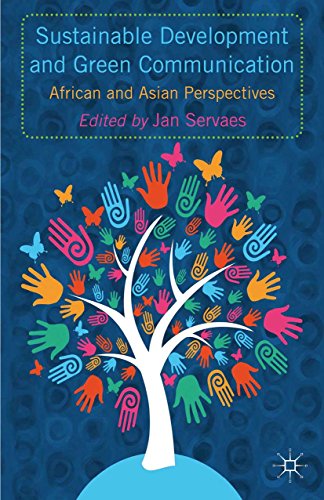
By J. Servaes
A Corporate Welfare Economy (Economics as Social Theory) by James Angresano
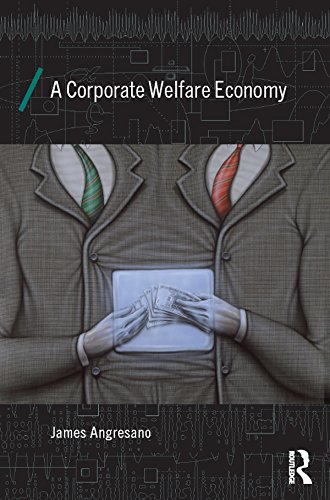
By James Angresano
Although political rhetoric and public conception proceed to imagine that the USA is the very definition of a unfastened industry financial system, a unique process completely has really come to prominence over the last part century.
This company Welfare economic system (CWE) has happen as executive come more and more lower than the effect of company pursuits and lobbyists, with supposedly equalising components reminiscent of law skewed for you to swimsuit the pursuits of the privileged whereas an overpowering majority of US voters have skilled a decline of their average of living.
James Angresano examines the features of this mode of capitalism, either from the theoretical standpoint but additionally with key connection with the various sectors of the financial system – exchange, production, and safeguard between them.
After the Financial Crisis: Shifting Legal, Economic and by Pablo Iglesias-Rodriguez,Anna Triandafyllidou,Ruby Gropas
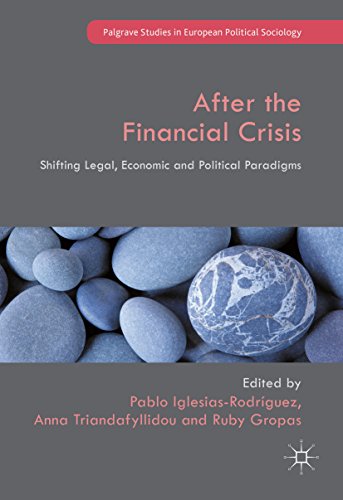
By Pablo Iglesias-Rodriguez,Anna Triandafyllidou,Ruby Gropas
This foreign assortment experiences how the monetary difficulty of 2007 and the consequent economic
and political crises in Europe and North the USA have prompted a method of
change within the box of economics, legislations and
politics. members to this e-book argue that either elites and voters have
had to reconsider the character of the industry, the position of the nation as a market
regulator and as a supplier of welfare, the function of political events in
representing society’s major political and social cleavages, the function of civil
society in voicing the worries of electorate, and the function of the citizen as the
ultimate resource of strength in a democracy but in addition as a essentially powerless
subject in a world economy.
The e-book reviews the actors, the components and the processes
that have carried ahead the switch and proposes the inspiration of ‘incomplete
paradigm shift’ to examine this transformation. Its authors discover the multiple
dimensions of paradigm shifts and their differentiated evolution, arguing that
today we witness an incomplete paradigm shift of economic regulations,
economic versions and welfare structures, yet a stillbirth of a brand new political and
economic paradigm.
Early Modern Capitalism: Economic and Social Change in by MAARTEN PRAK
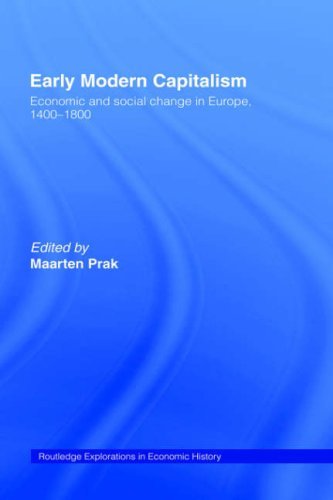
By MAARTEN PRAK
Financial Market Regulation and Reforms in Emerging Markets by Masahiro Kawai,Eswar S. Prasad
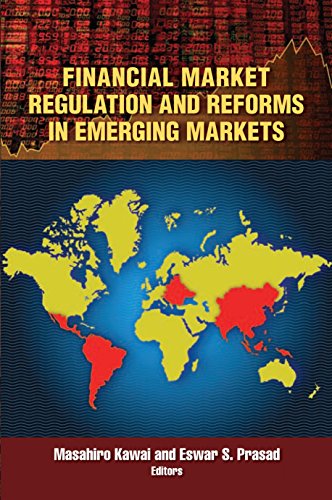
By Masahiro Kawai,Eswar S. Prasad
The swift unfold and far-reaching influence of the worldwide monetary problem have highlighted the necessity for strengthening monetary structures in complex economies and rising markets. rising markets face specific demanding situations in constructing their nascent monetary platforms and making them resilient to family and exterior shocks. monetary reforms are serious to those economies as they pursue courses of excessive and sustainable growth.
In this well timed quantity Masahiro Kawai, Eswar Prasad, and their participants supply a scientific review of contemporary advancements inand the newest pondering aboutregulatory frameworks in either complicated nations and rising markets. Their analyses and observations basically indicate the demanding situations to enhancing legislation, potency of markets, and entry to the fi nancial process. Policymakers and fiscal managers in rising markets are suffering to benefit from the problem and may have to grapple with a few key questions as they restructure and reform their monetary markets:
What classes does the worldwide monetary concern of 200709 supply for the institution of effective and versatile regulatory structures?
How can policymakers increase broader monetary markets whereas dealing with the linked risks?
Howor shouldthey make the formal economy extra obtainable to extra people?
How may perhaps they most sensible deal with multinational monetary institutions?
This publication is a vital step in getting a greater take hold of of those matters and making growth towards options that strike a stability among selling monetary industry improvement and potency at the one hand, and making sure monetary balance at the other.
Urban Labor Economics by Yves Zenou

By Yves Zenou
The Political Economy of Rural-Urban Conflict: Predation, by Topher L. McDougal
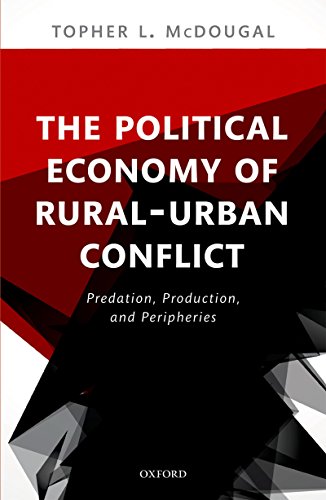
By Topher L. McDougal
dramatically assorted results. In West Africa (Liberia and Sierra Leone), capital towns grew to become monetary objectives for rebels, who posed dire threats to the survival of the kingdom. In Maoist India, regardless of an rebel ideology aiming to overthrow the kingdom through a method of revolutionary urban seize, the
combat frontier successfully firewalls towns from Maoist violence.
This booklet argues that alternate networks underpinning the industrial courting among rural and concrete components - termed 'interstitial economies' - may possibly vary dramatically of their effect on (and reaction to) the wrestle frontier. It explains insurgent predatory trends in the direction of towns as a functionality of shipping networks permitting monopoly gains to be made via urban-based investors. It explains wrestle frontier delineation as a functionality of the social constitution of the exchange networks: hierarchical networks
permit elite-elite deals that cohere the frontier. those components symbolize what could be termed respectively the 'hardware' and 'software' of the rural-urban monetary relationship.
Of curiosity to any pupil of political financial system and violence, this booklet offers new arguments and insights in regards to the relationships among violence and the economic climate, predation and construction, middle and periphery.
Growth and Poverty in Sub-Saharan Africa (WIDER Studies in by Channing Arndt,Andy McKay,Finn Tarp
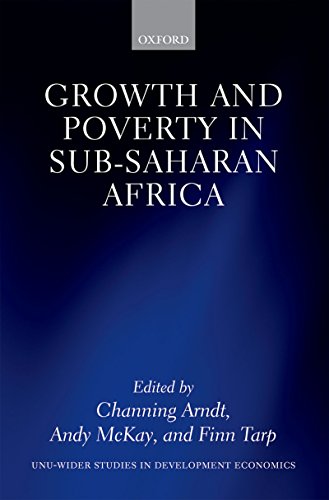
By Channing Arndt,Andy McKay,Finn Tarp
corresponding to almost seventy five% of the whole inhabitants. A notable variety of expertise emerges. whereas financial signs greater in lots of nations, others are but to achieve channeling some great benefits of financial development into the wallet of the bad. a few international locations skilled little monetary progress, and
saw little fabric growth for the bad. while, the massive majority of nations have made extraordinary development in key non-monetary symptoms of wellbeing.
Overall, the African progress renaissance earns cheers, yet no longer 3. whereas earnings in macroeconomic and political balance are genuine, also they are fragile. development on a in line with capita foundation is far better than within the Eighties and Nineteen Nineties, but no longer quick in comparison with different constructing areas. Importantly from a pan-African standpoint, key economies-particularly Kenya, Nigeria, and South Africa-are no longer one of the greater performers.
Looking ahead, practical expectancies are required. the advance approach is, normally, a protracted challenging slog. however, actual and sturdy components seem to be at play at the sub-continent with confident implications for progress and poverty relief in future.
Environmentalism in Turkey: Between Democracy and by Fikret Adaman,Murat Arsel
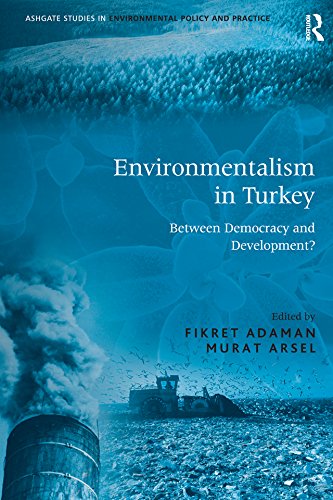
By Fikret Adaman,Murat Arsel
The Coming of Age of Information Technologies and the Path by Davide Gualerzi
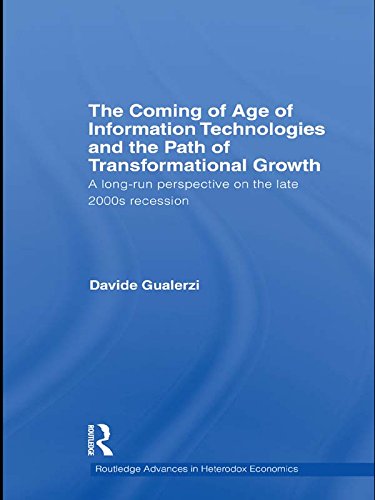
By Davide Gualerzi
In this ebook, Davide Gualerzi employs the concept that of transformational development to discover the investment-driven cycle of enlargement of the Nineteen Nineties within the US economic system, and of the of function performed by means of the ICT sector.
The publication articulates a view of demand-led development during which the focal point is on potent call for, the composition of the expansion method and the hyperlink among altering composition and enlargement.